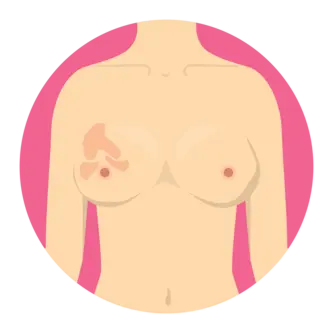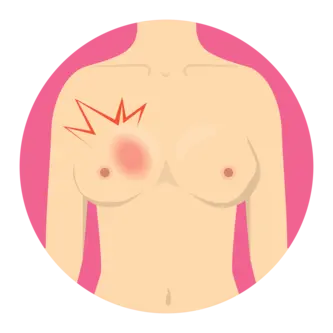What is Breast Cancer?
Breast cancer is a formidable adversary, which one in every 27 Malaysian women face and conquer. Breast cancer occurs when cells in the breast grow uncontrollably. It can start in different parts of the breast, such as the ducts or lobules.
Types of Breast Cancer
Ductal Carcinoma In Situ (DCIS): A non-invasive cancer where cells are confined to the ducts.
Invasive Ductal Carcinoma (IDC): The most common type, spreading to nearby tissues.
Triple-Negative Breast Cancer (TNBC): Aggressive and harder to treat due to the lack of hormone receptors.
HER2-Positive Breast Cancer: Caused by the overexpression of the HER2 protein, often treatable with targeted therapies.
Signs and Symptoms
 | 1. Skin changes on the breast, such as dimpling or redness |
|---|---|
 | 2. Nipple discharge that is not related to breastfeeding |
 | 3. Unexplained pain the breast or nipple area |
 | 4. Changes in the size or shape of the breast |
 | 5. A lump or thickened tissue in the breast or armpit |
Key Risk Factors
- Poor lifestyle choices (alcohol consumption, smoking, lack of exercise)
- Starting your period before the age of 12
- Late menopause
- Having children after the age of 35
- Hormone replacement therapy
- Family history of breast cancer
- Carrier of the BRCA gene
Diagnosis
- Breast Self-Exam: Performed monthly at home, to identify any suspicious lumps
- Mammogram: A key screening tool to detect abnormalities. Recommended for women above 40 years old.
- Ultrasound: Used to detect any lumps and usually are recommended for women below 40 years old.
- Biopsy: If there’s a suspicious lump or mass is found during the test, biopsy will be done to confirms diagnosis by examining tissue samples or fluid from the breast.
Treatment of Breast Cancer
- Surgery
Surgery for breast cancer may be a mastectomy which entails removal of the entire breast or breast conserving surgery or lumpectomy which would entail removal of the lump. Breast conserving surgery would however depend on the site and size of the breast lump - Chemotherapy
Systemic chemotherapy would be required as part of treatment following surgery to reduce the risk of recurrence of cancer and improve chances of cure. You would need to see an oncologist for further discussions on the type of chemotherapy and how many sessions would be needed. - Radiotherapy
Radiotherapy is the use of X-rays to treat cancers. It is usually given as an adjunct after surgery and chemotherapy to reduce risk of the recurrence of cancer. It may also be used in Stage 4 Cancers to treat the symptoms of the spread of cancer. - Endocrine therapy
Some breast cancers are hormone sensitive, which means that they would require the hormone Estrogen and Progesterone to grow and therefore will need to be blocked by taking medication in the form of tablets.
Prevention
While breast cancer cannot always be prevented, there are steps you can take to reduce your risk. These include maintaining a healthy lifestyle through regular exercise, a balanced diet, limiting alcohol consumption, and avoiding smoking. Early detection through regular screenings and self-exams is another vital aspect of prevention.
Navigating breast cancer can be daunting, but with the right information, support, and a positive outlook, you can face it head-on.
Remember, you are not alone, and there is hope in every step of your journey. Stay strong, stay determined, and believe in your ability to overcome breast cancer.








